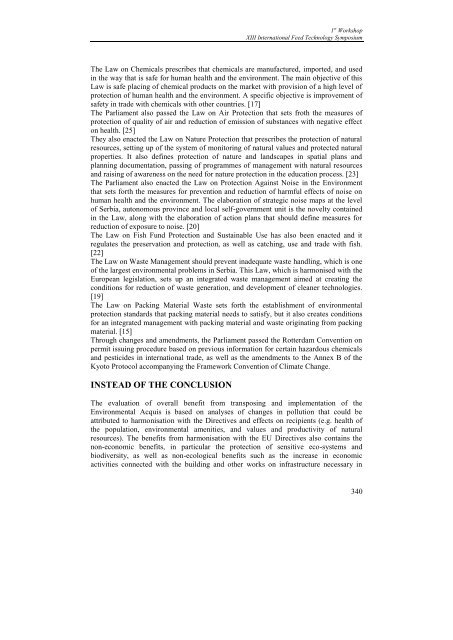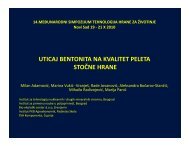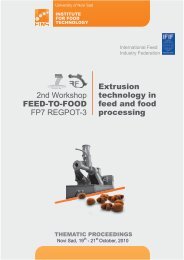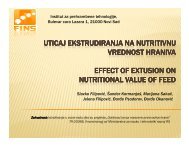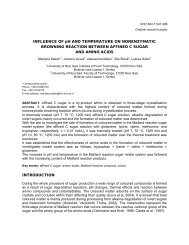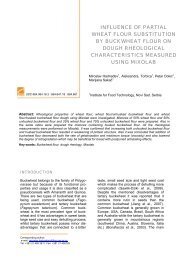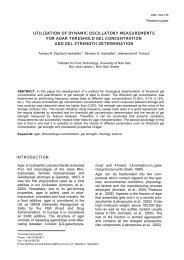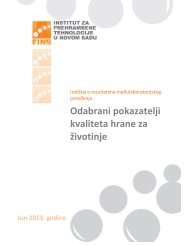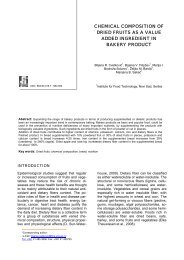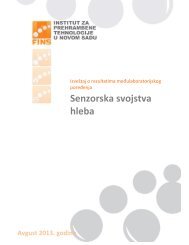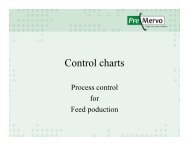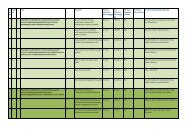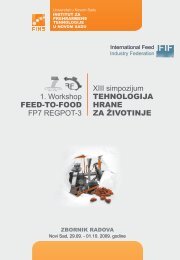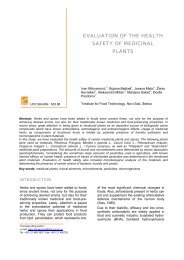Effects of dietary n-3 polyunsaturated fatty acids and ... - FINS
Effects of dietary n-3 polyunsaturated fatty acids and ... - FINS
Effects of dietary n-3 polyunsaturated fatty acids and ... - FINS
You also want an ePaper? Increase the reach of your titles
YUMPU automatically turns print PDFs into web optimized ePapers that Google loves.
1 st WorkshopXIII International Feed Technology SymposiumThe Law on Chemicals prescribes that chemicals are manufactured, imported, <strong>and</strong> usedin the way that is safe for human health <strong>and</strong> the environment. The main objective <strong>of</strong> thisLaw is safe placing <strong>of</strong> chemical products on the market with provision <strong>of</strong> a high level <strong>of</strong>protection <strong>of</strong> human health <strong>and</strong> the environment. A specific objective is improvement <strong>of</strong>safety in trade with chemicals with other countries. [17]The Parliament also passed the Law on Air Protection that sets froth the measures <strong>of</strong>protection <strong>of</strong> quality <strong>of</strong> air <strong>and</strong> reduction <strong>of</strong> emission <strong>of</strong> substances with negative effecton health. [25]They also enacted the Law on Nature Protection that prescribes the protection <strong>of</strong> naturalresources, setting up <strong>of</strong> the system <strong>of</strong> monitoring <strong>of</strong> natural values <strong>and</strong> protected naturalproperties. It also defines protection <strong>of</strong> nature <strong>and</strong> l<strong>and</strong>scapes in spatial plans <strong>and</strong>planning documentation, passing <strong>of</strong> programmes <strong>of</strong> management with natural resources<strong>and</strong> raising <strong>of</strong> awareness on the need for nature protection in the education process. [23]The Parliament also enacted the Law on Protection Against Noise in the Environmentthat sets forth the measures for prevention <strong>and</strong> reduction <strong>of</strong> harmful effects <strong>of</strong> noise onhuman health <strong>and</strong> the environment. The elaboration <strong>of</strong> strategic noise maps at the level<strong>of</strong> Serbia, autonomous province <strong>and</strong> local self-government unit is the novelty containedin the Law, along with the elaboration <strong>of</strong> action plans that should define measures forreduction <strong>of</strong> exposure to noise. [20]The Law on Fish Fund Protection <strong>and</strong> Sustainable Use has also been enacted <strong>and</strong> itregulates the preservation <strong>and</strong> protection, as well as catching, use <strong>and</strong> trade with fish.[22]The Law on Waste Management should prevent inadequate waste h<strong>and</strong>ling, which is one<strong>of</strong> the largest environmental problems in Serbia. This Law, which is harmonised with theEuropean legislation, sets up an integrated waste management aimed at creating theconditions for reduction <strong>of</strong> waste generation, <strong>and</strong> development <strong>of</strong> cleaner technologies.[19]The Law on Packing Material Waste sets forth the establishment <strong>of</strong> environmentalprotection st<strong>and</strong>ards that packing material needs to satisfy, but it also creates conditionsfor an integrated management with packing material <strong>and</strong> waste originating from packingmaterial. [15]Through changes <strong>and</strong> amendments, the Parliament passed the Rotterdam Convention onpermit issuing procedure based on previous information for certain hazardous chemicals<strong>and</strong> pesticides in international trade, as well as the amendments to the Annex B <strong>of</strong> theKyoto Protocol accompanying the Framework Convention <strong>of</strong> Climate Change.INSTEAD OF THE CONCLUSIONThe evaluation <strong>of</strong> overall benefit from transposing <strong>and</strong> implementation <strong>of</strong> theEnvironmental Acquis is based on analyses <strong>of</strong> changes in pollution that could beattributed to harmonisation with the Directives <strong>and</strong> effects on recipients (e.g. health <strong>of</strong>the population, environmental amenities, <strong>and</strong> values <strong>and</strong> productivity <strong>of</strong> naturalresources). The benefits from harmonisation with the EU Directives also contains thenon-economic benefits, in particular the protection <strong>of</strong> sensitive eco-systems <strong>and</strong>biodiversity, as well as non-ecological benefits such as the increase in economicactivities connected with the building <strong>and</strong> other works on infrastructure necessary in340


